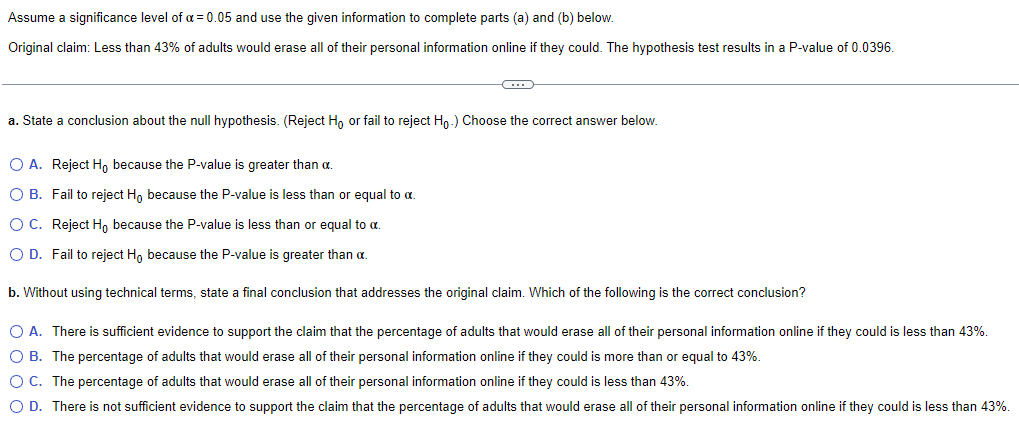Assume a significance level of a = 0.05 and use the given information to complete parts (a) and (b) below. Original claim: Less than 43% of adults would erase all of their personal information online if they could. The hypothesis test results in a P-value of 0.0396. C a. State a conclusion about the null hypothesis. (Reject Ho or fail to reject Ho.) Choose the correct answer below. O A. Reject Ho because the P-value is greater than a. O B. Fail to reject Ho because the P-value is less than or equal to a. O C. Reject Ho because the P-value is less than or equal to a. O D. Fail to reject Ho because the P-value is greater than a. b. Without using technical terms, state a final conclusion that addresses the original claim. Which of the following is the correct conclusion? O A. There is sufficient evidence to support the claim that the percentage of adults that would erase all of their personal information online if they could is less than 43%. O B. The percentage of adults that would erase all of their personal information online if they could is more than or equal to 43%. O C. The percentage of adults that would erase all of their personal information online if they could is less than 43%. OD. There is not sufficient evidence to support the claim that the percentage of adults that would erase all of their personal information online if they could is less than 43%.
Assume a significance level of a = 0.05 and use the given information to complete parts (a) and (b) below. Original claim: Less than 43% of adults would erase all of their personal information online if they could. The hypothesis test results in a P-value of 0.0396. C a. State a conclusion about the null hypothesis. (Reject Ho or fail to reject Ho.) Choose the correct answer below. O A. Reject Ho because the P-value is greater than a. O B. Fail to reject Ho because the P-value is less than or equal to a. O C. Reject Ho because the P-value is less than or equal to a. O D. Fail to reject Ho because the P-value is greater than a. b. Without using technical terms, state a final conclusion that addresses the original claim. Which of the following is the correct conclusion? O A. There is sufficient evidence to support the claim that the percentage of adults that would erase all of their personal information online if they could is less than 43%. O B. The percentage of adults that would erase all of their personal information online if they could is more than or equal to 43%. O C. The percentage of adults that would erase all of their personal information online if they could is less than 43%. OD. There is not sufficient evidence to support the claim that the percentage of adults that would erase all of their personal information online if they could is less than 43%.
Glencoe Algebra 1, Student Edition, 9780079039897, 0079039898, 2018
18th Edition
ISBN:9780079039897
Author:Carter
Publisher:Carter
Chapter4: Equations Of Linear Functions
Section: Chapter Questions
Problem 8SGR
Related questions
Question

Transcribed Image Text:Assume a significance level of a = 0.05 and use the given information to complete parts (a) and (b) below.
Original claim: Less than 43% of adults would erase all of their personal information online if they could. The hypothesis test results in a P-value of 0.0396.
a. State a conclusion about the null hypothesis. (Reject Ho or fail to reject Ho.) Choose the correct answer below.
O A. Reject Ho because the P-value is greater than α.
Fail to reject Ho because the P-value is less than or equal to a
O B.
O C. Reject Ho because the P-value is less than or equal to α.
O D. Fail to reject Ho because the P-value is greater than a.
b. Without using technical terms, state a final conclusion that addresses the original claim. Which of the following is the correct conclusion?
O A. There is sufficient evidence to support the claim that the percentage of adults that would erase all of their personal information online if they could is less than 43%.
OB. The percentage of adults that would erase all of their personal information online if they could is more than or equal to 43%.
O C. The percentage of adults that would erase all of their personal information online if they could is less than 43%.
O D. There is not sufficient evidence to support the claim that the percentage of adults that would erase all of their personal information online if they could is less than 43%.
Expert Solution
This question has been solved!
Explore an expertly crafted, step-by-step solution for a thorough understanding of key concepts.
This is a popular solution!
Trending now
This is a popular solution!
Step by step
Solved in 3 steps

Recommended textbooks for you

Glencoe Algebra 1, Student Edition, 9780079039897…
Algebra
ISBN:
9780079039897
Author:
Carter
Publisher:
McGraw Hill

College Algebra (MindTap Course List)
Algebra
ISBN:
9781305652231
Author:
R. David Gustafson, Jeff Hughes
Publisher:
Cengage Learning

Glencoe Algebra 1, Student Edition, 9780079039897…
Algebra
ISBN:
9780079039897
Author:
Carter
Publisher:
McGraw Hill

College Algebra (MindTap Course List)
Algebra
ISBN:
9781305652231
Author:
R. David Gustafson, Jeff Hughes
Publisher:
Cengage Learning